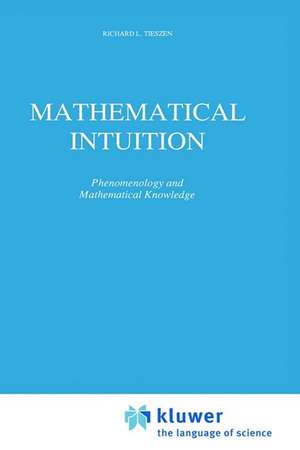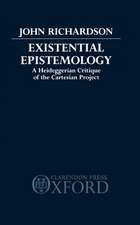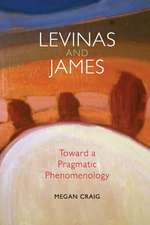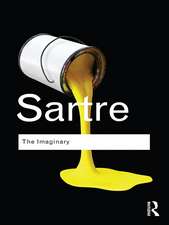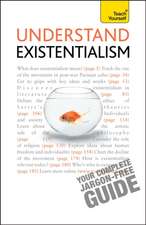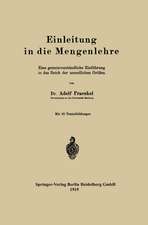Mathematical Intuition: Phenomenology and Mathematical Knowledge: Synthese Library, cartea 203
Autor R.L. Tieszenen Limba Engleză Hardback – 30 iun 1989
| Toate formatele și edițiile | Preț | Express |
|---|---|---|
| Paperback (1) | 1099.35 lei 6-8 săpt. | |
| SPRINGER NETHERLANDS – 21 apr 2014 | 1099.35 lei 6-8 săpt. | |
| Hardback (1) | 1105.47 lei 6-8 săpt. | |
| SPRINGER NETHERLANDS – 30 iun 1989 | 1105.47 lei 6-8 săpt. |
Din seria Synthese Library
- 15%
 Preț: 638.43 lei
Preț: 638.43 lei - 18%
 Preț: 989.98 lei
Preț: 989.98 lei - 15%
 Preț: 596.69 lei
Preț: 596.69 lei - 18%
 Preț: 903.93 lei
Preț: 903.93 lei - 15%
 Preț: 586.88 lei
Preț: 586.88 lei - 15%
 Preț: 696.50 lei
Preț: 696.50 lei - 18%
 Preț: 892.90 lei
Preț: 892.90 lei - 15%
 Preț: 643.34 lei
Preț: 643.34 lei -
 Preț: 282.33 lei
Preț: 282.33 lei - 5%
 Preț: 372.19 lei
Preț: 372.19 lei -
 Preț: 443.10 lei
Preț: 443.10 lei - 15%
 Preț: 637.59 lei
Preț: 637.59 lei - 18%
 Preț: 958.88 lei
Preț: 958.88 lei - 15%
 Preț: 642.36 lei
Preț: 642.36 lei - 18%
 Preț: 1230.66 lei
Preț: 1230.66 lei - 15%
 Preț: 642.83 lei
Preț: 642.83 lei - 18%
 Preț: 1000.39 lei
Preț: 1000.39 lei -
 Preț: 389.70 lei
Preț: 389.70 lei - 15%
 Preț: 637.28 lei
Preț: 637.28 lei - 18%
 Preț: 952.26 lei
Preț: 952.26 lei - 18%
 Preț: 1231.32 lei
Preț: 1231.32 lei - 15%
 Preț: 645.96 lei
Preț: 645.96 lei -
 Preț: 395.85 lei
Preț: 395.85 lei -
 Preț: 400.47 lei
Preț: 400.47 lei - 18%
 Preț: 1225.48 lei
Preț: 1225.48 lei - 15%
 Preț: 638.89 lei
Preț: 638.89 lei - 18%
 Preț: 1232.09 lei
Preț: 1232.09 lei -
 Preț: 380.45 lei
Preț: 380.45 lei -
 Preț: 394.87 lei
Preț: 394.87 lei - 15%
 Preț: 640.37 lei
Preț: 640.37 lei - 15%
 Preț: 639.08 lei
Preț: 639.08 lei -
 Preț: 381.98 lei
Preț: 381.98 lei - 15%
 Preț: 643.00 lei
Preț: 643.00 lei - 15%
 Preț: 672.29 lei
Preț: 672.29 lei
Preț: 1105.47 lei
Preț vechi: 1348.14 lei
-18% Nou
Puncte Express: 1658
Preț estimativ în valută:
211.56€ • 229.72$ • 177.71£
211.56€ • 229.72$ • 177.71£
Carte tipărită la comandă
Livrare economică 23 aprilie-07 mai
Preluare comenzi: 021 569.72.76
Specificații
ISBN-13: 9780792301318
ISBN-10: 0792301315
Pagini: 210
Ilustrații: XVI, 210 p.
Dimensiuni: 155 x 235 x 14 mm
Greutate: 0.5 kg
Ediția:1989
Editura: SPRINGER NETHERLANDS
Colecția Springer
Seria Synthese Library
Locul publicării:Dordrecht, Netherlands
ISBN-10: 0792301315
Pagini: 210
Ilustrații: XVI, 210 p.
Dimensiuni: 155 x 235 x 14 mm
Greutate: 0.5 kg
Ediția:1989
Editura: SPRINGER NETHERLANDS
Colecția Springer
Seria Synthese Library
Locul publicării:Dordrecht, Netherlands
Public țintă
ResearchCuprins
1. The Concept of Intuition in Mathematics.- 1. Introduction.- 2. Knowledge, Evidence, and Intuition.- 3. Intuition “of” and Intuition “that”.- 4. Some Recent Views of Mathematical Intuition.- 5. Hilbert and Bernays.- 6. Parsons.- 7. Brouwer.- 8. Some “Extended” Proof-Theoretic Views.- 9. Gödel on Sets.- 10. Platonism and Constructivism.- 11. Mathematical Truth and Mathematical Knowledge.- 12. Principal Objections to Mathematical Intuition.- 2. The Phenomenological View of Intuition.- 1. Introduction.- 2. Intentionality and Intuition.- 3. Intuition of Abstract Objects.- 4. Acts of Abstraction and Abstract Objects.- 5. Acts of Reflection.- 6. Types and Degrees of Evidence.- 7. Comparison with Kant.- 8. Intuition and the Theory of Meaning.- 3. Perception.- 1. Introduction.- 2. Sequences of Perceptual Acts.- 3. The Horizon of Perceptual Acts.- 4. The Possibilities of Perception.- 5. The “Determinable X” in Perception and Indexicals.- 6. Perceptual Evidence.- 7. Phenomenological Reduction and the Problem of Realism / Idealism.- 4. Mathematical Intuition.- 1. Introduction.- 2. Objections About Analogies Between Perceptual and Mathematical Intuition.- 3. Objections Based on Structuralism.- 4. Objections About Founding.- 5. A Logic Compatible With Mathematical Intuition and the Notion of Construction.- 6. Is Classical Mathematics to be Rejected?.- 5. Natural Numbers I.- 1. Introduction.- 2. The Concept of Number Cannot Be Explicitly Defined.- 3. The Origin of the Concept of Number.- 4. Intuition of Natural Numbers.- 5. Ordinals.- 6. Ordinals and Cardinals.- 7. Constructing Units and the Role of Reflection and Abstraction.- 8. Syntax and Representations of Numbers.- 6. Natural Numbers II.- 1. Introduction.- 2. 0 and 1.- 3. Numbers Formed by ArithmeticOperations.- 4. Small Numbers and Singular Statements About Them.- 5. Large Numbers and Mathematical Induction.- 6. The Possibilities of Intuition.- 7. Summary of the Argument for Large Numbers.- 8. Further Comments on Mathematical Induction.- 9. Intuition and Axioms of Elementary Number Theory.- 7. Finite sets.- 1. Introduction.- 2. A Theory of Finite Sets.- 3. The Origin of the Concept of Finite Set.- 4. Intuition of Finite Sets.- 5. Comparison with Gödel and Wang.- 6. Unit Sets, the Empty Set, and Mereology vs. Set Theory.- 7. Large Sets and a Hierarchy of Sets.- 8. Illusion in Set Theory.- 9. Concluding Remarks.- 8. Critical Reflections and Conclusion.- 1. Introduction.- 2. Summary of the Account.- 3. Areas for Further Work.- 4. Platonism, Constructivism, and Benacerraf’s Dilemma.- Notes.
Recenzii
`This book is a very welcome addition to the small number of texts which succeed in bridging the gap between the phenomenological tradition in philosophy of mathematics and the analytic tradition. The author shows very convincingly that the phenomenological tradition is a rich source of subtle and fertile ideas which are highly relevant to central problems in contemporary philosophy of mathematics.'
Mathematical Reviews
Mathematical Reviews
